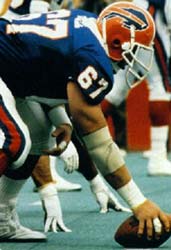Buffalo Bills Center
When Bills’ fans recall the no-huddle offense that terrorized NFL defenses in the early 1990s, the names Kelly, Thomas and Reed spring quickly to mind, for these were the marquee players who lit up the scoreboard. As vital as these men were to the Bills success, each one would undoubtedly acknowledge that the key to the no-huddle offense was its brilliant offensive line, anchored by All-Pro center Kent Hull.
As a boy growing up in the delta town of Greenwood, Mississippi, Hull didn’t hunger for the NFL; basketball was his first passion. Although he starred in both sports in high school, football eventually won out as his tall frame began to fill out. He was the starting center at Mississippi State for four seasons and parlayed an outstanding college career into selection as a seventh round pick of the New Jersey Generals of the United States Football League in 1983. Hull didn’t anticipate an NFL career when the USFL folded after three seasons, but he also never anticipated the injury to center Tim Vogler which created an opportunity for an experienced center with the Buffalo Bills. The Bills signed Hull in August 1986, on the same day that Jim Kelly became a Bill.
Kent’s versatility was the key to his success, and to his NFL longevity. The Bills ran a traditional offense upon Kelly’s arrival and ran it well enough to win division titles in 1988 and 1989. Hull’s contributions to those teams were recognized by selection to the Pro-Bowl squad in 1989. However, the birth of the no-huddle offense in 1990 not only changed the team’s offensive philosophy, but placed new demands and responsibilities on its center. Hull not only adapted, but flourished, gaining Pro-Bowl status in 1990 and 1991 as the Bills won their first two American Football Conference Championships.
The complexity of any center’s job is often unappreciated by fans, but this was particularly true in Hull’s situation. The no-huddle offense is severely physically demanding and forces a center to read defenses and react quickly. The Bills’ wide-open offense also required Hull to block opposing nose tackles one-on-one. Hull’s teammates appreciated the key role he played as the hub of the offense, however, and his coaches considered him among the best ever to play the game at his position.
Hull’s contract expired after the Bills’ disappointing 1994 season, but he eschewed potential riches elsewhere to stay with the Bills for two additional seasons. His loyalty was rewarded by two more trips to the playoffs in 1995 and 1996. In 1997, Kent’s years of tireless, quiet service to his team were recognized by the community as he joins teammate Jim Kelly as the first members of the Bills’ Super Bowl teams inducted into the Greater Buffalo Sports Hall of Fame.


